Tag: Ukraine
Stevenson’s army, March 30
– IGs report on Ukraine aid.
– RUSI reports on Ukraine lessons.
-WaPo reports on Bibi-Biden split; Axios has more.
– Axios reports on how Zients runs the WH. Note that SecTreas Yellen attends the staff meeting.
-USD Kahl explains why no F16s to Ukraine.
-Trump think tank prepares “battle plans” for Mexico
– Senate votes 66-30 to repeal Iraq AUMFs, but McCarthy may not take House vote.
– Feds work hard to recruit young employees.
My SAIS colleague Charlie Stevenson distributes this almost daily news digest of foreign/defense/national security policy to “Stevenson’s army” via Googlegroups. I republish here, with occasional videos of my choice. To get Stevenson’s army by email, send a blank email (no subject or text in the body) to stevensons-army+subscribe@googlegroups.com. You’ll get an email confirming your join request. Click “Join This Group” and follow the instructions to join. Once you have joined, you can adjust your email delivery preferences (if you want every email or a digest of the emails).
Stevenson’s army, March 29
– WSJ says Russian economy is weakening-
– Harvard prof lists options for enlarging the House.
-Tom Friedman says Netanyahu can’t be trusted
-Navy prof summarizes the role of intelligence in the Iraq war.
–McConnell opposes Iraq AUMF repeal.
– WaPo tells about the SAIS student accused as a Russian spy.
My SAIS colleague Charlie Stevenson distributes this almost daily news digest of foreign/defense/national security policy to “Stevenson’s army” via Googlegroups. I republish here, with occasional videos of my choice. To get Stevenson’s army by email, send a blank email (no subject or text in the body) to stevensons-army+subscribe@googlegroups.com. You’ll get an email confirming your join request. Click “Join This Group” and follow the instructions to join. Once you have joined, you can adjust your email delivery preferences (if you want every email or a digest of the emails).
Stevenson’s army, March 24
– US retaliates after deadly drone strike in Syria.
– US complained to Israel about new law.
– Dan Drezner warns about Taiwan dilemmas, citing this article.
– CSIS study sees Chinese pressure ineffective. Here’s that report.
– WSJ says – Ukraine trouble getting troops.
-Canada doesn’t want to take lead in Haiti.
– Blinken refuses to declassify dissent cable.
– RollCall finds less party unity in House, more in Senate last year.
– Senate is taking up AUMF repeal, but look at Politico’s list of amendments:
Here’s a quick rundown of amendment to expect in the Senate next week on the AUMF:
- Sen. Ted Cruz’s (R-Texas) amendment would empower “the President to use force against forces of Iran, a state responsible for conducting and directing attacks against United States forces in the Middle East and to take actions for the purpose of ending Iran’s escalation of attacks on, and threats to, United States interests.”
- Sen. Ron Johnson’s (R-Wis.) amendment would require Senate approval for any World Health Organization convention or agreement or treaty.
- Sen. Rick Scott’s (R-Fla.) amendment would create a joint select committee to look into the United States/Afghanistan withdrawal in 2021.
- Sen. Pete Ricketts’ (R-Neb.) amendment would require the president to certify “that Iraq, Israel,and other United States partners and allies in the region have been meaningfully consulted on the ramifications of repeal.”
- Sen. Dan Sullivan’s (R-Alaska) amendment ensures that the AUMF repeal won’t impact the effectiveness of U.S. response to Iran.
- Sen. Josh Hawley’s (R-Mo.) amendment would appoint an inspector general to oversee Ukraine aid.
Stevenson’s army, March 23
I am back from a week in Doha when I wasn’t posting, and Charlie is back from a few days away:
Back at my desktop and partway through the accumulated newspapers, here are some links.
– Stimson has a bunch of reports. I especially liked the “Chimera of Technological Superiority” paper.
– Lots of Iraq reflections [today is the 20th anniversary of the start of the US war]. Reporter John Walcott was right. As was Jim Fallows.
– A Marine calls for a more family friendly military personnel system
– SAIS prof Ed Joseph sees a Kosovo deal.
– US News said US intell helped India against China.
– Fred Kaplan assesses the Xi-Putin summit. WaPo notes the absence of a pipeline deal.
– Two views on US aid to Ukraine: surprising success or much too slow.
– NYT analyzes DeSantis foreign policy.
– Max Boot sees return to 1930s GOP foreign policy.
– RollCall notes Biden’s high success rate with Congress.
My SAIS colleague Charlie Stevenson distributes this almost daily news digest of foreign/defense/national security policy to “Stevenson’s army” via Googlegroups. I republish here, with occasional videos of my choice. To get Stevenson’s army by email, send a blank email (no subject or text in the body) to stevensons-army+subscribe@googlegroups.com. You’ll get an email confirming your join request. Click “Join This Group” and follow the instructions to join. Once you have joined, you can adjust your email delivery preferences (if you want every email or a digest of the emails).
The easy way out leads to failure
I spoke yesterday at a US-Europe Alliance panel on the impact of the Russian invasion of Ukraine in the Western Balkans. Here are my notes:
Let me start by making three point I regard as obvious:
- Russian military aggression in Ukraine has a counterpart in the Balkans There the aggression is via hybrid warfare directed from Serbia, mainly against Kosovo, Bosnia and Herzegovina, Montenegro, and Macedonia.
- If Russia succeeds in gaining territory in Ukraine, we should expect a far more aggressive effort in the Balkans.
- If Russia fails in Ukraine, it will fail as well in the Balkans.
Why?
Why then, you should ask, has the State Department been so soft on Serbia, Russia’s main agent in the Balkans? The US has allowed billions of dollars of development bank investments to go to Belgrade. The Pentagon is trying to revive military cooperation with the Serbian army. The State Department backed unproductive and unjustified decisions by the HiRep in Bosnia that favored Croat extremists and sanctioned Serbs. American officials befriended and encouraged a narrowly elected pro-Russian government in Montenegro. They have insisted on early formation of an Association of Serb-majority Municipalities in Kosovo, a proposition that would weaken the still young Kosovo state.
Some regard these moves as recent. But they are better regarded as part of a long history of taking the easy way out in the Balkans. As difficult as they were, the Dayton accords seemed easier to Washington in 1995 than defeat of Republika Srpska. After Milosevic fell to the 2000 election in Serbia, the Americans quickly gave unequivocal support to his successors. They cut off funding to the Otpor Resistance movement that intended to keep a sharp eye on the democratization process. Senator Biden argued in a hearing several years later that it would be better to get Serbia into the EU accession process than to insist it earn candidacy on the merits.
Serbia’s response
The Serbian government took advantage of that support to reject the Ahtisaari plan for Kosovo’s independence. It instead established Serbia as a militarily “neutral” country. Belgrade rearmed as best it could, mainly with Russian help. When Serbia’s disappointing but relatively liberal “democrats” lost the 2012 election, Washington lined up behind their nationalist successors.
Many thought they could be convinced to resolve the Kosovo issue in a “Nixon to China” move. Presidents Nikolic and then Vucic declined to do so. President Vucic’s minions now talk openly about a “Serbian world.” That is analogous to Vladimir Putin’s “Russian world” and a synonym of Greater Serbia. It is only a matter of time before Serbia walks away from the French-German proposed agreement that Vucic refused to sign last month.
Washington however has been unresponsive and ineffective. Vucic’s unwillingness to sign, Republika Srpska’s “national day” display of force, Belgrade’s threats of military action in Kosovo, the Bosnia HiRep’s decision to change the way votes are counted the day after an election, the compromise of NATO secrets by Montenegro’s pro-Russian government, control of the press, harassment of liberal democrats, and corruption in Serbia—none of these developments have elicited an effective response from Washington.
Unedifying
The explanation is far less than edifying. Washington doesn’t give a hoot about the Balkans. The region is too complicated, too peripheral, too aggravating. So it delegates hegemony to a “pivotal state.” The State Department thinks that is Serbia, which is central geographically, larger than its neighbors, a bit better off economically, and a far more consolidated state than the other former Yugoslav republics.
If you delegate a pivotal state to control a region, you have to put up with most of its behavior, both in the region and at home. If the pivotal state in addition maintains good relations with your adversaries, you will fear a tilt in that direction. Hence the US government’s reluctance to call out Belgrade, even when it sides with Moscow and Beijing in foreign policy and slides inexorably toward autocracy at home.
This is a sad commentary, not only on American diplomacy. It sadly favors a Russian proxy over states truly aspiring to join the West. That’s ugly. But it is also sad for the region, which has good reason to fear instability. Bosnia, Kosovo, and Montenegro all face threats to their sovereignty and territorial integrity as a result of America’s treatment of Serbia as the pivotal state in the Balkans.
But it is sad also for Serbia, which no longer meets the Copenhagen democracy criteria for EU membership. Vucic can do what he pleases domestically, without concern about constraints on his power. And it is sad for Kyiv, which should worry that whatever the Americans agree in the Balkans they may copy in Ukraine. How about an Association of Russian-majority municipalities in Donbas?
To put it plainly: the easy way out leads to failure.
PS: Take a moment to look at Demush Shasha’s pertinent tweets from today:
Four important takeaways from today’s @freedomhouse “Freedom in the World 2023” report.
1. Kosovo is democratic trailblazer of the region. Kosovo made record annual democratic improvement and ranked as third most improved democracy in the world in 2022.
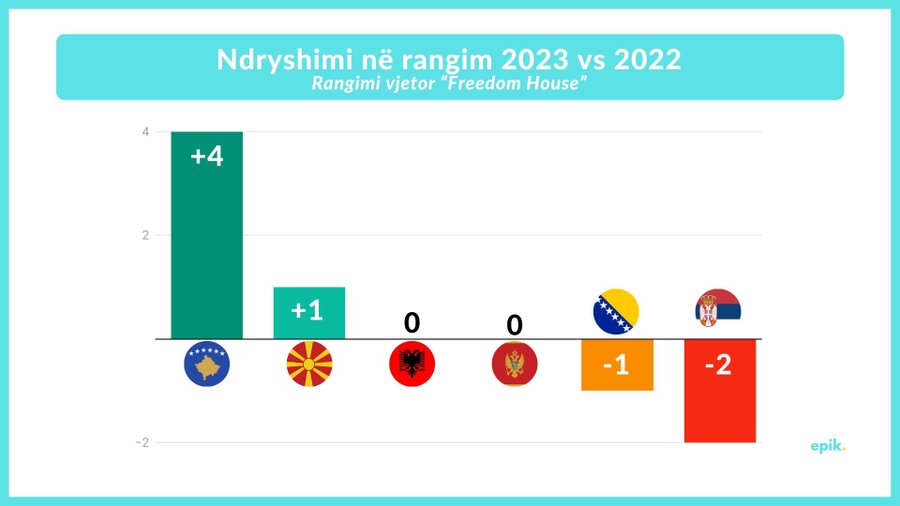
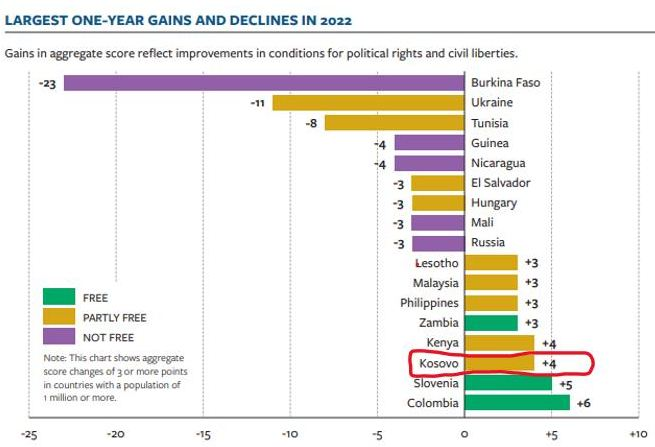
2. Kosovo and Serbia democracies are heading to totally opposite directions.
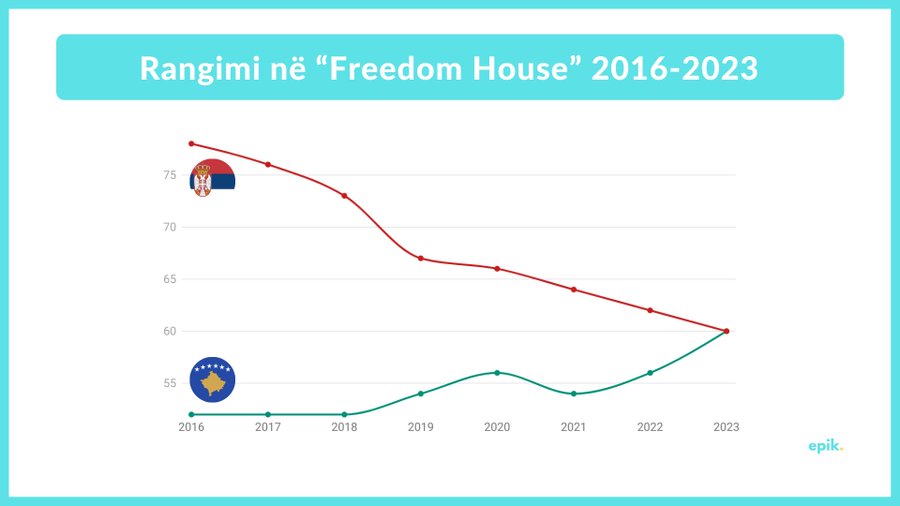
3. Looking at a longer time scale, only Kosovo and North Macedonia have today a better democracy then a decade ago. Albania has made no progress, while Serbia, Montenegro and Bosnia have worst democracies today then a decade ago.
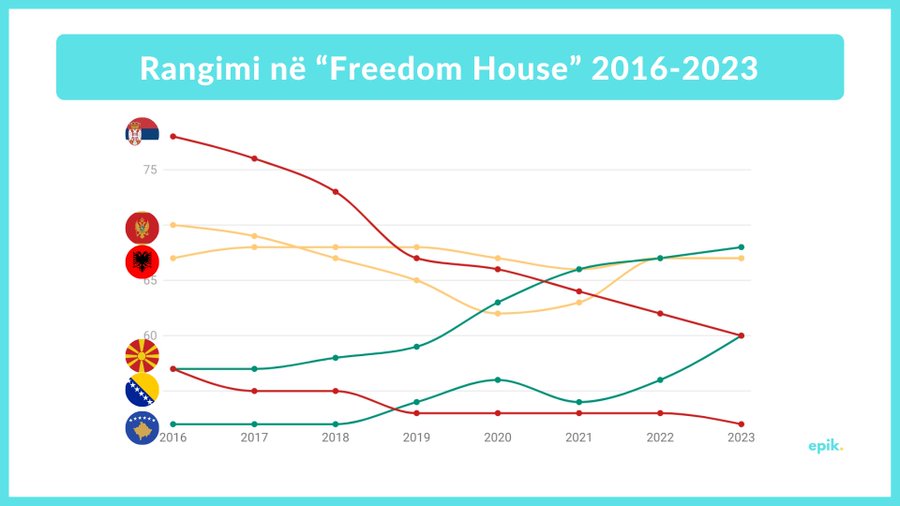
4. Serbia’s democratic collapse is in particular staggering. A decade long democratic nosedive has put it now in a category with Afghanistan and Myanmar.
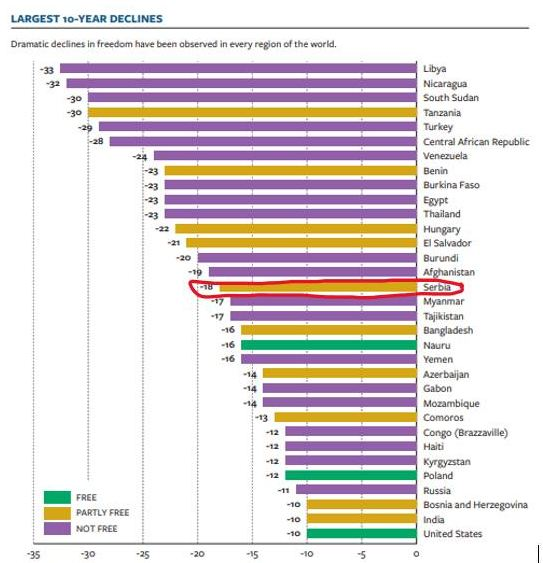
Stevenson’s army, March 9
– The administration’s proposed FY 2024 budget will be released at noon. Details will be here, as well as at departmental websites.
– Meanwhile, here’s what the CBO director told the House.
– And what NYT says the House GOP wants.
– Big interagency fight over giving data to ICC. Where you stand…
– I posted the IC annual assessment yesterday. Here’s DNI testimony on Ukraine.
– NBC says China is hard place for US spies.
– House rejected GOP measure to recall US troops from Syria.
– David Rothkopf warns about zero-sum China policy.
Now NYT let’s you search for first use of terms.
My SAIS colleague Charlie Stevenson distributes this almost daily news digest of foreign/defense/national security policy to “Stevenson’s army” via Googlegroups. I republish here, with occasional videos of my choice. To get Stevenson’s army by email, send a blank email (no subject or text in the body) to stevensons-army+subscribe@googlegroups.com. You’ll get an email confirming your join request. Click “Join This Group” and follow the instructions to join. Once you have joined, you can adjust your email delivery preferences (if you want every email or a digest of the emails).




 RSS - Posts
RSS - Posts
